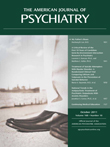Nitric Oxide Synthase Genotype Modulation of Impulsivity and Ventral Striatal Activity in Adult ADHD Patients and Healthy Comparison Subjects
Abstract
Objective:
Attention deficit hyperactivity disorder (ADHD) is a highly heritable disorder. The NOS1 gene encoding nitric oxide synthase is a candidate gene for ADHD and has been previously linked with impulsivity. In the present study, the authors investigated the effect of a functional variable number of tandem repeats (VNTR) polymorphism in NOS1 (NOS1 exon 1f-VNTR) on the processing of rewards, one of the cognitive deficits in ADHD.
Method:
A sample of 136 participants, consisting of 87 adult ADHD patients and 49 healthy comparison subjects, completed a reward-related impulsivity task. A total of 104 participants also underwent functional magnetic resonance imaging during a reward anticipation task. The effect of the NOS1 exon 1f-VNTR genotype on reward-related impulsivity and reward-related ventral striatal activity was examined.
Results:
ADHD patients had higher impulsivity scores and lower ventral striatal activity than healthy comparison subjects. The association between the short allele and increased impulsivity was confirmed. However, independent of disease status, homozygous carriers of the short allele of NOS1, the ADHD risk genotype, demonstrated higher ventral striatal activity than carriers of the other NOS1 VNTR genotypes.
Conclusions:
The authors suggest that the NOS1 genotype influences impulsivity and its relation with ADHD is mediated through effects on this behavioral trait. Increased ventral striatal activity related to NOS1 may be compensatory for effects in other brain regions.



